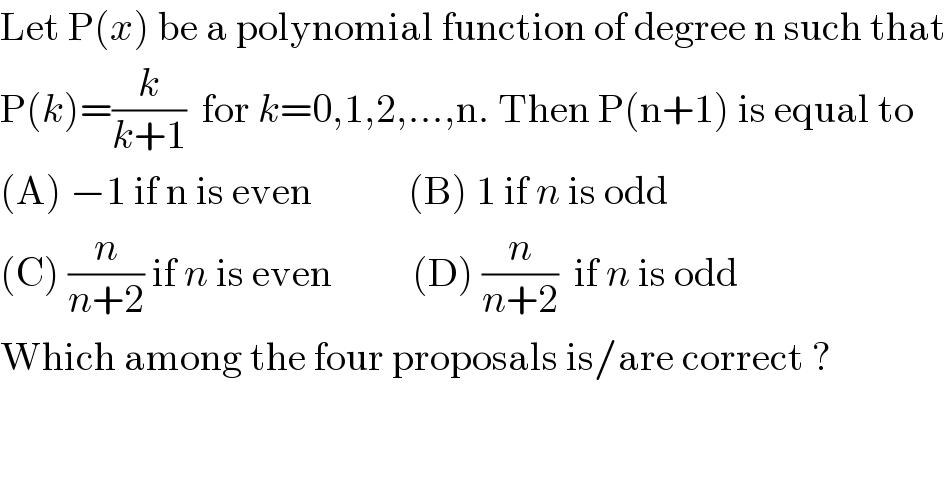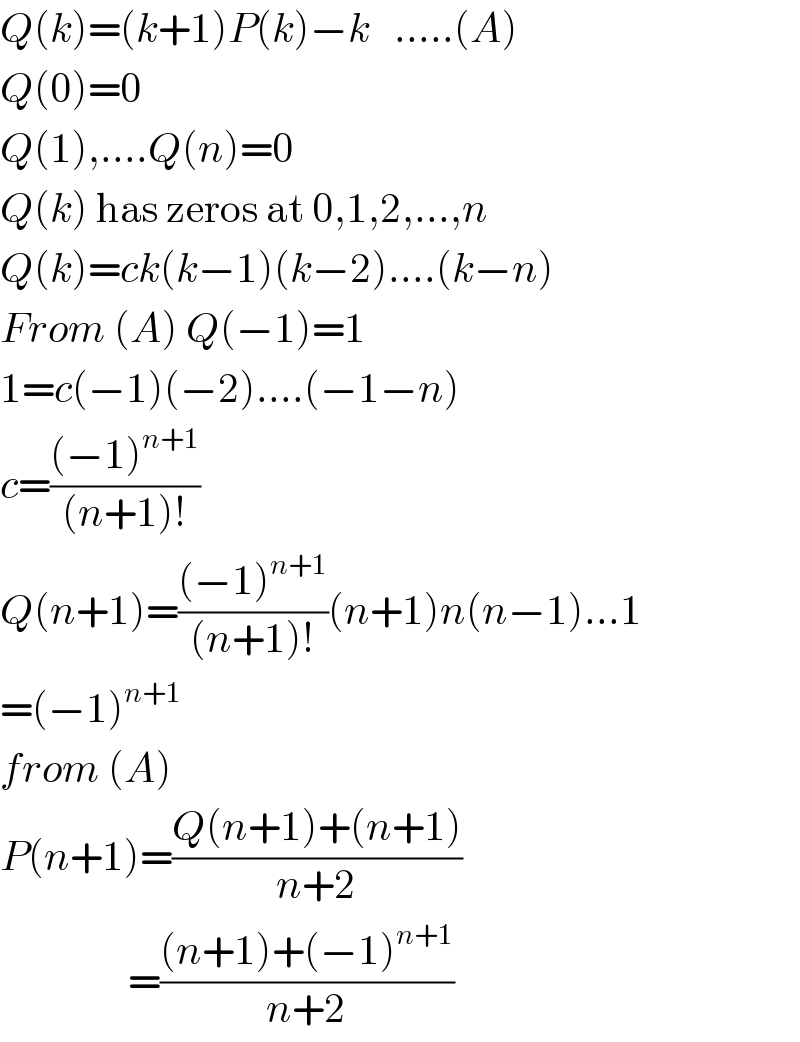Question Number 117649 by Ar Brandon last updated on 13/Oct/20

$$\mathrm{Let}\:\mathrm{P}\left({x}\right)\:\mathrm{be}\:\mathrm{a}\:\mathrm{polynomial}\:\mathrm{function}\:\mathrm{of}\:\mathrm{degree}\:\mathrm{n}\:\mathrm{such}\:\mathrm{that} \\ $$$$\mathrm{P}\left({k}\right)=\frac{{k}}{{k}+\mathrm{1}}\:\:\mathrm{for}\:{k}=\mathrm{0},\mathrm{1},\mathrm{2},…,\mathrm{n}.\:\mathrm{Then}\:\mathrm{P}\left(\mathrm{n}+\mathrm{1}\right)\:\mathrm{is}\:\mathrm{equal}\:\mathrm{to}\: \\ $$$$\left(\mathrm{A}\right)\:−\mathrm{1}\:\mathrm{if}\:\mathrm{n}\:\mathrm{is}\:\mathrm{even}\:\:\:\:\:\:\:\:\:\:\:\:\left(\mathrm{B}\right)\:\mathrm{1}\:\mathrm{if}\:{n}\:\mathrm{is}\:\mathrm{odd} \\ $$$$\left(\mathrm{C}\right)\:\frac{{n}}{{n}+\mathrm{2}}\:\mathrm{if}\:{n}\:\mathrm{is}\:\mathrm{even}\:\:\:\:\:\:\:\:\:\:\left(\mathrm{D}\right)\:\frac{{n}}{{n}+\mathrm{2}}\:\:\mathrm{if}\:{n}\:\mathrm{is}\:\mathrm{odd} \\ $$$$\mathrm{Which}\:\mathrm{among}\:\mathrm{the}\:\mathrm{four}\:\mathrm{proposals}\:\mathrm{is}/\mathrm{are}\:\mathrm{correct}\:? \\ $$
Answered by prakash jain last updated on 13/Oct/20

$${Q}\left({k}\right)=\left({k}+\mathrm{1}\right){P}\left({k}\right)−{k}\:\:\:…..\left({A}\right) \\ $$$${Q}\left(\mathrm{0}\right)=\mathrm{0} \\ $$$${Q}\left(\mathrm{1}\right),….{Q}\left({n}\right)=\mathrm{0} \\ $$$${Q}\left({k}\right)\:\mathrm{has}\:\mathrm{zeros}\:\mathrm{at}\:\mathrm{0},\mathrm{1},\mathrm{2},…,{n} \\ $$$${Q}\left({k}\right)={ck}\left({k}−\mathrm{1}\right)\left({k}−\mathrm{2}\right)….\left({k}−{n}\right) \\ $$$${From}\:\left({A}\right)\:{Q}\left(−\mathrm{1}\right)=\mathrm{1} \\ $$$$\mathrm{1}={c}\left(−\mathrm{1}\right)\left(−\mathrm{2}\right)….\left(−\mathrm{1}−{n}\right) \\ $$$${c}=\frac{\left(−\mathrm{1}\right)^{{n}+\mathrm{1}} }{\left({n}+\mathrm{1}\right)!} \\ $$$${Q}\left({n}+\mathrm{1}\right)=\frac{\left(−\mathrm{1}\right)^{{n}+\mathrm{1}} }{\left({n}+\mathrm{1}\right)!}\left({n}+\mathrm{1}\right){n}\left({n}−\mathrm{1}\right)…\mathrm{1} \\ $$$$=\left(−\mathrm{1}\right)^{{n}+\mathrm{1}} \\ $$$${from}\:\left({A}\right) \\ $$$${P}\left({n}+\mathrm{1}\right)=\frac{{Q}\left({n}+\mathrm{1}\right)+\left({n}+\mathrm{1}\right)}{{n}+\mathrm{2}} \\ $$$$\:\:\:\:\:\:\:\:\:\:\:\:\:\:\:\:=\frac{\left({n}+\mathrm{1}\right)+\left(−\mathrm{1}\right)^{{n}+\mathrm{1}} }{{n}+\mathrm{2}} \\ $$
Commented by Ar Brandon last updated on 13/Oct/20
Thank You Sir
